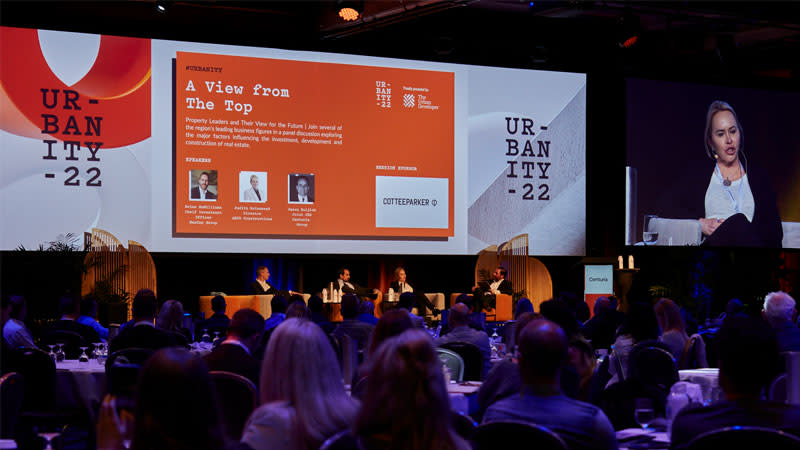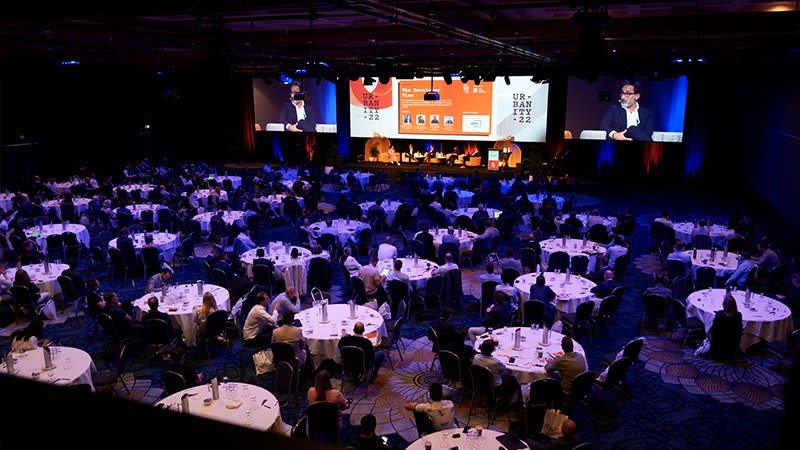
NOMINATIONS CLOSE SEPTEMBER 12 RECOGNISING THE INDIVIDUALS BEHIND THE PROJECTS
NOMINATIONS CLOSING SEPTEMBER 12 URBAN LEADER AWARDS
Resources
Newsletter
Stay up to date and with the latest news, projects, deals and features.
Subscribe
A financier, asset manager and a builder sit down for an honest discussion.
While the climate outside of The Urban Developer’s third edition of the Urbanity conference at The Star on the Gold Coast is sundrenched and balmy, the economic environment across Australia’s property landscape is far more turbulent and trying.
“Although there are many challenges right now for the industry, I’m feeling incredibly optimistic,” ADCO Constructions chairman Judith Brinsmead said.
“However, the current issue for many builders are fixed price contracts and work-in-hand.”
“Construction companies, working in my competitor base, are often working on very low margins—often at under 2 per cent, while inflation and other factors have building costs increasing up to 70 per cent in some areas.”
While real estate assets can have an inherent inflationary hedge, a growing number of developers and builders have been caught out in recent months with inadequate internal structures making for unviable projects and untenable businesses.
Rising prices from materials and labour shortages are already putting great pressure on construction-related businesses with pressure only expected to start abating from late 2023.
Total construction sector inflation is on track to hit 6 per cent over the year to December with construction activity reversing for last month, as a shortage of materials continues to collide with higher rates.
The Reserve Bank of Australia has been pushing ahead with its inflation-fighting interest rate rises, again lifting the official cash rate 0.5 of a percentage point higher to 1.85 per cent on Tuesday, which caught many in the property industry by surprise.

“It's a very difficult thing to manage but clients and even governments—particularly the Western Australia and Victoria governments, have been very willing to talk openly about it and share the risk,” Brinsmead said.
“The Australian Bureau of Statistics is still expecting 7 per cent growth in the volume of construction coming through the pipeline this year, after being 13 per cent the previous year, and while that can be a cause for concern, I’m using the word ‘optimism’ because things can change quickly.”
For non-bank lenders like MaxCap Group, the challenging climate has presented an opportunity to not just be a “fair weather” lender but now play a more central role in funding projects and get them built faster than the traditional commercial banks.
“I agree with Judith, builders and developers are working hard together at the moment to ‘share the risk’ but I think the financier behind these projects now has a bit of responsibility also and a role to play,” MaxCap Group chief investment officer Bill McWilliams said.
“The biggest challenge in the inflationary environment is that the majority of the book we fund is construction lending and ensuring feasibilities are still stacking up—from getting squeezed on funding costs to getting squeezed on construction costs.”
“It's integral that all three parties are ensuring that there is a healthy pipeline of projects for our developers on the horizon.”
While the money markets have changed dramatically in Australia over the last decade as the big banks continue to reduce their exposure to riskier assets such as shopping malls, hotels, lower grade offices and residential developments.
Looking ahead, non-bank lenders are increasing their share of the commercial real estate debt market, expected to hit more than $50 billion by 2024.
Meanwhile, in the residential development space, where banks’ exposure has continued to flatline over recent years, many developers have turned to non-bank lenders for construction finance or even equity investments.

“Six or seven years ago we were only letting the big banks lend in this space but the market over the last few years has been very favourable to non-bank lenders and has evolved to give developers a level of flexibility,” McWilliams said.
“Three years ago we set up a direct investment team, so we are not just sitting in the debt portion of the stack but also support developers when they need enquiry assistance.”
Jason Huljich, joint chief executive of Centuria Capital Group, an ASX-listed specialist investment manager with a 35-year track record, said opportunities had opened up for REIT’s to diversify and take chances on niche and often misunderstood asset classes.
“Diversification sums up our last five years,” Huljich said.
“Looking back, eight years ago, we were primarily office. Today we are across office, industrial, healthcare, neighbourhood and large-format retail, as well as agriculture—these are what we consider best in class for merging into our platform.
“Buyers are clearly heading towards sectors where there is continuous pricing—build-to-rent, industrial, hotels and healthcare.
“The pandemic has really shone a light on healthcare assets. We hold and are developing a number of private hospitals with really high quality tenants and long leases—without operational risk—holding them in our funds.
“We’re backing the theme and growing trend of short-stay hospitals and we see a huge runway of opportunity in this space moving into the future.”
Huljich said, despite the difficult conditions across the wider property industry, the asset manager was keen to establish more property funds, both listed and unlisted, after lifting its group assets under management beyond $20.2 billion during its 2021-22.